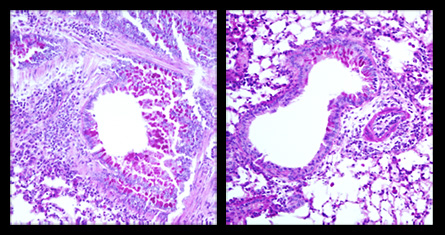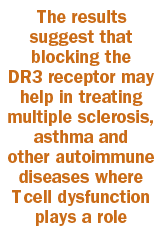Take a chill pill, T cell
A receptor on infection-fighting cells may be a novel target for drugs that fight autoimmune disease.
In people with autoimmune diseases like multiple sclerosis and asthma, infection-fighting cells go haywire and wage war against the body’s own tissue, causing inflammation. Existing treatments can prevent the immune system from getting out of control, but can also compromise a person’s ability to fight some infections.


But a new study suggests that a specific receptor on immune cells holds promise as a target for treating such disorders, perhaps without affecting immunity.
The receptor, called DR3, lies on the surface of T cells, which help the body combat infection. When a molecule called TL1A binds to the receptor, it spurs the T cells into action. But this same interaction can also lead the T cells to attack healthy tissue. Turning off the gene for this receptor seems to quell this inflammation in mice, researchers report online June 19 in the journal Immunity.
It wasn’t far-fetched to think DR3 may play a role in autoimmune disease. DR3 is part of a family of TNF receptors, which are involved in activating immune cells and have been implicated in autoimmune disease, says Michael Croft, an immunologist at the La Jolla Institute for Allergy and Immunology in California, who was not involved in the study.
What’s more, DR3 looks very similar to another receptor implicated in inflammation, says Richard Siegel of the National Institute of Arthritis and Musculoskeletal and Skin Diseases in Bethesda, Md, who was involved in the study.
So, researchers wanted to see where in the chemical pathway of immunity DR3 is active. When Siegel and his colleagues tried to stimulate T cells into action in a petri dish, they found that cells lacking the DR3 receptor could still multiply and differentiate at near normal levels. Subsequent experiments showed that DR3 and its partner TL1A seemed essential only for getting T cells into specific tissue.
“There’s regulation at many stages of immune activation leading to immune mediated-disease,” Siegel says. “It’s not only getting the T cell activated, there’s a critical step that TL1A seems to mediate — getting into target tissue and causing disease.”
To test whether DR3 had a hand in autoimmune response, researchers relied on techniques often used to model asthma and multiple sclerosis in animals. They studied both normal mice and “knockout” mice that lacked the gene to make the DR3 receptor. In both sets, Siegel’s team primed the mice’s immune systems to be allergic to a specific protein. Then the team injected the same protein into the mice’s lungs.
In normal mice, the injection causes T cells to attack lung tissue, leading to extreme airway inflammation. By contrast, mice lacking the DR3 receptor had much less lung inflammation.
To mimic multiple sclerosis in the mice, the group used a similar method, this time inoculating nerve cells rather than the lungs. In normal mice, this method drove T cells to destroy the sheaths covering nerve cells, paralyzing the mice. The knockout mice, by contrast, did not have such nerve damage.
Still immune
While the results suggest DR3 might be a promising candidate for targeted drugs, the team needed to show that mice lacking DR3 could still fight off infections. Existing immune-blocking drugs, called TNF blockers, have revolutionized treatment of autoimmune diseases like Crohn’s disease and rheumatoid arthritis, Siegel says. Yet they can also weaken the body’s defenses and make it more susceptible to disease. “It can reduce host defense to tuberculosis, so now everyone going on TNF blockers has to get TB testing,” he says.
So the researchers tested how the knockout mouse immune system fared against a parasite called Toxoplasma gondii. The team used T. gondii because mice fighting off the parasite require robust activation of T cells; mice with weak T cell activity will die from the infection within one week. The mice lacking the receptor still mustered up a healthy response to the parasite, indicating that DR3 is not essential for fighting off the infection, Siegel’s team found.
Though still preliminary, the results suggest that blocking the DR3 receptor may help in treating multiple sclerosis, asthma and other autoimmune diseases where T cell dysfunction plays a role, says Tania Watts, an immunologist at the University of Toronto in Canada.
Croft agrees.
“It’s certainly a very provocative study and has put DR3 and TL1A in the same type of therapeutic league as some of the other members of the TNF receptor family,” he says.
Moving forward
Still, researchers need to confirm that DR3 isn’t essential in fighting off other infections, Watts says. So researchers should see how knockout mice hold up against influenza. “We want to know if it’s a good treatment for lung inflammation for asthma,” she says. “So what’s it going to do with a common lung infection?”
Even if DR3 knockout mice are hale and hearty after a battery of immune assaults, the results need to be translated to humans, Siegel says. Since researchers can’t simply knock out DR3 genes in humans, the team needs to use a drug that keeps TL1A from binding to the DR3 receptor, he says. But developing that drug could happen quickly, he adds.
“Because [DR3] is the same family of receptors as TNF, companies can go very quickly,” he says. “They can probably make this blocking antibody within a matter of months because they know how to do these things so well.”
From there, it may be three to five years before clinical trials could start, assuming all goes well, he says.







